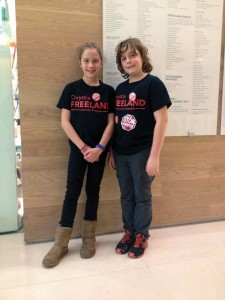Campaign marked by strong candidates
By Annemarie Brissenden
Take a moment and indulge in a thought experiment.
Imagine a room filled with people engaged in the business of politics. It could be in Parliament during question period, a human rights hearing at the United Nations, or a G8 meeting. Do you have the image? Now, take away the men.
How many people are left?
Launched last month, #MoreWomen is a social media campaign that does the work for you. Designed to demonstrate the scarcity of women in political leadership roles, it takes iconic pictures of political gatherings and removes the men. The resulting images are unsettling: women barely able stretch their arms from one to another in a cavernous House of Commons, a seated woman surrounded by emptiness, and still another woman standing alone in a board room.
It illustrates a stark reality: there aren’t enough women in politics. And in University-Rosedale, where two very accomplished women were the front-runners in a highly competitive race, that reality had many voters wishing they could cast their ballots for more than one candidate.
In the end, the Liberal Party of Canada’s Chrystia Freeland took the seat over Jennifer Hollett, who ran for the New Democratic Party (NDP). Freeland was previously the member of Parliament for the old riding of Toronto-Centre.
“Chrystia Freeland brings knowledge and experience that will put Canada on the map internationally in terms of being compassionate and engaged,” said Jo-Ann Davis, Toronto Catholic District School Board trustee (Ward 9, St. Paul’s/Toronto-Centre/Trinity-Spadina). “I really like [Jennifer Hollett] as well. She’s a wonderful candidate. It’s unfortunate that they couldn’t win in different ridings.”
Sarah Armstrong, a Freeland supporter, echoed the sentiment.
She described Hollett as an “amazing candidate”, and said she wished the women had run in different ridings so “I could vote for both of them. I hope it says something about women in politics generally.”
“A lot of people are ready for a woman in office,” said Aliya Bhatia. The NDP volunteer — who conceded that if Hollett couldn’t take the riding, “I’m glad [University-Rosedale] got Chrystia Freeland” — was shocked by the enormity of the Liberal win.
“By the end, I knew the Liberals had momentum,” said Hollett, admitting she was also surprised by the results, “but I don’t think I expected a majority. I am disappointed for my loss, [and] devastated that we have lost so many great MPs.”
Although Freeland wasn’t expecting such a victory, she said she was “cautiously optimistic from the very beginning”.
“Some people forgot that three new downtown ridings had been carved out of two ridings held by Liberal MPs elected in recent by-elections,” she explained, lauding the riding’s field of candidates, which included Karim Jivraj for the Conservative Party and the Green Party’s Nick Wright.
“I really respect them; it was an honour to run in the same contest,” said Freeland, noting that University-Rosedale chose from a “strong, smart, [and] committed group of candidates”.
Hollett agreed, describing the race as exciting and highly competitive.

Ten-year old twins Felixe and Julian Pellizzari celebrated Chrystia Freeland’s win at the Liberal candidate’s election night party at the Gardiner Museum on Oct. 23. Annemarie Brissenden, Gleaner News
“It was an honour to run against Chrystia,” she said. “One of the reasons we got into politics is to see more women in office. I see a future where this is the norm, where impressive women are running against each other.”
With this election, Canadians have sent 88 women out of a possible 338 to the House of Commons. At 26 per cent, that’s up slightly from 24.6 per cent in the last general election, and behind at least 50 other nation-states when it comes to the number of women represented in national assemblies. Among them are the United Kingdom, with 29.4 per cent, Mexico (42.4 per cent), and Sweden (43.6 per cent).
“We do need more women running,” said Davis.
As Freeland puts it, “half of our population are women, [so] half of our politicians should be women.”
Despite her disappointment at the outcome for her party, Hollett is excited about the newly-elected prime minister’s promise for gender parity in the cabinet.
“We have to invite women to the table,” said Hollett. “We have to make space for women and make sure there is room for women in other roles.”
Freeland is rumoured to be up for consideration for a cabinet position, and if chosen, she’d bring a lot of experience to the role.
“Chrystia Freeland is an international figure, a national figure, as well as a local figure,” said Bill Graham, who represented Toronto-Centre from 1993 to 2007, during which time he served as the foreign affairs minister and minister of defence. “She has a big brain and a big capacity to be important in our country.”
Scott Dullen, a Justin Trudeau staffer who came to Toronto to work on Freeland’s campaign, added that “she’s one of the better MPs on the Hill: she cares about her constituents, has accolades after her name. She’s incredible.”
For now, Freeland — who said one of her immediate priorities is rail safety — is concentrating on getting to know her new riding, and connecting with University-Rosdale’s other elected representatives.
She hopes the Liberals’ congenial “sunny ways” approach, with its focus on “what we can build together, rather than tear down”, will get more people engaged, including women and young people.
Freeland also has a special message for all women and girls who are contemplating entering politics.
“Do it!”
Subsequent to this writing, Chrystia Freeland was sworn in as the Minister of Internatinoal Trade.
